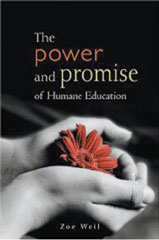October
2005
Education
that Teaches
Book Review by Maureen C. Wyse
|

|
The Power and Promise
of Humane Education by Zoe Weil (Canada: New Society Publishers, 2004). $15.95
paperback.
173 pages.
If only the world thought more like Zoe Weil. Or rather, if only people
would take to heart the lessons from her newest book. The Power
and Promise of Humane Education is a template for education, designed to
make way for a better tomorrow. Weil lays out the realities of our
disintegrating planet and its wasteful human culprits and teaches not
only about environmental choices for change, but also social justice,
animal advocacy and awareness. The idea behind humane education is
the importance of teaching children the correct choices that will provide
a more sustainable, equitable and humane future. Weil argues that it
is imperative for parents and teachers to educate kids about what is
going on in the world instead of shrouding them from it.
Weil begins the book by laying out her hopes for the future and detailing her
work with the International Institute for Humane Education, the cornerstone upon
which this teaching method has been built. This useful book includes sections
on implementing humane principles, FAQs, and activities to promote kindness in
children’s critical thinking. Her book closes with a handy resource guide
for humane decision-making.
Weil argues that there is power in giving children more choices than mainstream
education permits. The Power and Promise of Humane Education comes face to face
with issues such as advertising, the media, multinational monopolies, corporate
control, sweatshops, slavery, racism, sexism, homophobia, global warming, pollution,
species extinction, genetic engineering of foods, and animal exploitation, to
name a few. By learning to face these issues, children are able to, at early
ages, discern good from bad and see the impact their choices have on the world.
Humane education enables children to use creative, critical thinking, which in
turn allows for even more humane choices.
From page one, Weil argues as if there is no other option for teaching—all
students should know about our dying planet and the terrible injustices inflicted
upon humans, animals and the environment. Not afraid to challenge mainstream
teaching, she points out what is wrong with Nike shoes and McDonald’s Happy
Meals. She explains in detail the work standards, and environmental and social
costs of popular culture. This approach forces children to see where their food,
clothing, school supplies, soda cans and everything else, comes from. Each lesson
ends in a positive and effective way; children are asked what alternatives they
think are available, and then presented with a variety of humane choices. These
lessons can be catered to students of all ages and is an essential aid for educators,
parents and anyone concerned about our future.
Weil concludes, “the power and promise of humane education [is] young people,
equipped with knowledge and compassion, living according to humane values, and
making the world a better place for themselves and everyone else.” Incorporate
these decisions into your own life and inform others how to do the same, because
the only way change will come is if it is taught from the ground up.
 |
|
|
 |